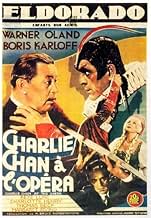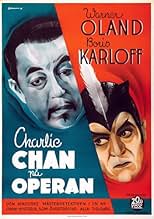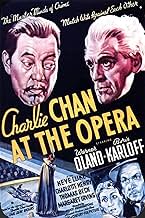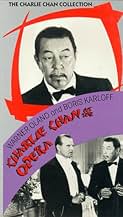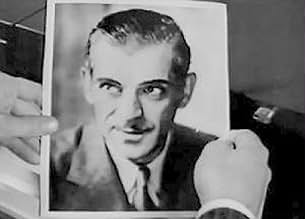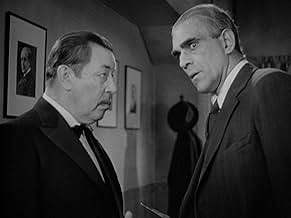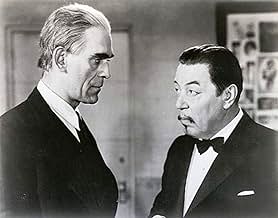CALIFICACIÓN DE IMDb
7.1/10
2.4 k
TU CALIFICACIÓN
Agrega una trama en tu idiomaA dangerous amnesiac escapes from an asylum, hides in the opera house, and is suspected of getting revenge on those who tried to murder him 13 years ago.A dangerous amnesiac escapes from an asylum, hides in the opera house, and is suspected of getting revenge on those who tried to murder him 13 years ago.A dangerous amnesiac escapes from an asylum, hides in the opera house, and is suspected of getting revenge on those who tried to murder him 13 years ago.
- Dirección
- Guionistas
- Elenco
Larry Arnold
- Villager in Opera
- (sin créditos)
William Bailey
- Detective
- (sin créditos)
Charles Bancroft
- Soldier in Opera
- (sin créditos)
John Bleifer
- Orderly
- (sin créditos)
Stanley Blystone
- Backstage Cop Who Shoots Gravelle
- (sin créditos)
Opiniones destacadas
This entry in the long-running and hugely popular 'Charlie Chan' series takes us into the distinguished - and a bit decadent - world of grand opera: famous soprano singer Lilli Rochelle, eccentric and somewhat conceited, is on the brink of hysteria because she's received a death threat for the very same day - her opening night in Los Angeles, after being away for seven years. And on exactly the same day, an amnesiac breaks out of a mental asylum after seven years; because, as soon as he sees her picture in the papers, he seems to remember something...
Meanwhile, we learn that second soprano Anita Barelli is madly jealous of Lilli - not only because she's the star, but mainly because she's got an affair with her husband! And then there's a young couple hanging around backstage all the time, for some reason trying by all means to get to Lilli - but then the opera performance starts, and very soon a murderous drama REALLY worthy of any opera libretto begins to take its course...
Except for the comic relief provided by Lee Chan and the cops, this film is pretty earnest, at times dramatic, if not even melodramatic; but we must undoubtedly admit that Boris Karloff probably plays one of the BEST roles of his life here: mad, full of hatred, and then again pitiful and sympathetic... While in other movies he usually only showed parts of his full acting range at a time - here he demonstrates them all in one!
Meanwhile, we learn that second soprano Anita Barelli is madly jealous of Lilli - not only because she's the star, but mainly because she's got an affair with her husband! And then there's a young couple hanging around backstage all the time, for some reason trying by all means to get to Lilli - but then the opera performance starts, and very soon a murderous drama REALLY worthy of any opera libretto begins to take its course...
Except for the comic relief provided by Lee Chan and the cops, this film is pretty earnest, at times dramatic, if not even melodramatic; but we must undoubtedly admit that Boris Karloff probably plays one of the BEST roles of his life here: mad, full of hatred, and then again pitiful and sympathetic... While in other movies he usually only showed parts of his full acting range at a time - here he demonstrates them all in one!
According to my sources, there seems to be a slight disagreement on the singing in this movie. Denis Gifford's Karloff bio says that Karloff did his own singing (and he could have; he was a fair baritone and sang in the Dulwich College chorus). Oscar Levant's autobiography claims that Karloff was dubbed. Oscar Levant, however, seems to have been writing from an unreliable memory, as he gets other details wrong including the movie synopsis. There are three singing voices heard in the movie: soprano, tenor, and baritone. The tenor was never seen, but was heard onstage while Chan and Number One Son were backstage. Both actresses playing sopranos were synching to the same recording. Karloff may also have been synching to a recording, but it could well have been his own, both for the reason given above and because Levant's opera was written for the movie--no previous recordings existed at the time, and why would the studio have spent extra money on a second singer for a B-budget film when they already had someone on the film who could handle the baritone singing? (Even the Faust costume worn by both baritones onstage was secondhand--it was first worn by Lawrence Tibbett in "Metropolitan", filmed earlier in 1936!)
Of all the mystery detectives who made their mark on the big screen, the most easily recognizable was Charlie Chan. Originally created by Earl Derr Biggers, he went on to star in some thirty or forty episodes, Although Warner Oland appears in this film " Charlie Chan, at the Opera " this would become his last as Sidney Tolar would later replace him. Director H. Bruce Humberstone makes much of the great talent he assembles when the late great Boris Karloff plays Gravelle. Keye Luke from 'Kung Fu' fame plays Charlie Chan's son. The story has Karloff playing a dark sinister character who seems quite mad. Escaping from an Insane asylum Gravelle promises to get revenge of the individual who tried to kill him in a fire. Besides the magnificent operatic voices, there is dark drama and intrigue in the film as the audience enjoys Karloff at his best as he matches wits with the great Honnlulu detective when murder and mayhem visit the Opera House. William Demarest makes for an appearance as a police officer. All in all, this is but one of the many movies, which intrigues audiences in the 30 and 40's. Recommended. ****
My favorite of the Warner Oland Chans, Charlie Chan At the Opera, is an excellent entry in the series. It begins like a horror film, on a stormy night, as Boris Karloff overcomes a guard in a sanitarium, then escapes. We are then introduced to a motley group of characters, including a temperamental opera diva, who has been recieving threatening notes, then Charlie and son arrive, and soon the action moves to the opera house, where the film remains. Karloff turns up backstage, where he is hiding, above the dressing rooms, and we soon learn the truth: he is a famous singer who had supposedly died in a fire but escaped, and has been suffering from amnesia ever since. He has only recently begun to remember who is, and is now looking for the person who tried to kill him.
There's a lot of plot in this film, and it isn't brilliantly developed. What makes the movie so watchable is the acting, which is uniformly good (and in Karloff's case outstanding); the music, courtesy of Oscar Levant, who wrote the score; the set design, which is marvelous; and occasionally the dialogue, which is often funny. Director Bruce Humberstone juggles all these elements masterfully, making the movie hum. Karloff brings gravitas and real menace to his part, and elicits pity as much as terror. Oland is his usually Buddha-like self, delivering his fortune cookie homilies with aplomb. William Demarest is the Irish cop this time around. As was so often the case with murder mysteries, a suggestion of the supernatural helps the mood enormously. Karloff isn't quite the phantom of the opera, but people react to him as if they've seen a ghost, since they all assume that he's dead.
The movie is a very accomplished piece of work. Its theatre and backstage atmosphere give it the feeling of a show within a show, and it's a pretty good one whichever way you look at it.
There's a lot of plot in this film, and it isn't brilliantly developed. What makes the movie so watchable is the acting, which is uniformly good (and in Karloff's case outstanding); the music, courtesy of Oscar Levant, who wrote the score; the set design, which is marvelous; and occasionally the dialogue, which is often funny. Director Bruce Humberstone juggles all these elements masterfully, making the movie hum. Karloff brings gravitas and real menace to his part, and elicits pity as much as terror. Oland is his usually Buddha-like self, delivering his fortune cookie homilies with aplomb. William Demarest is the Irish cop this time around. As was so often the case with murder mysteries, a suggestion of the supernatural helps the mood enormously. Karloff isn't quite the phantom of the opera, but people react to him as if they've seen a ghost, since they all assume that he's dead.
The movie is a very accomplished piece of work. Its theatre and backstage atmosphere give it the feeling of a show within a show, and it's a pretty good one whichever way you look at it.
A madman loose in an opera house is the background for Charlie Chan to investigate a double murder of leading singers in Charlie Chan At The Opera. Son Lee Chan played by Keye Luke even gets in the act as a member of the chorus with his fraternity buddies.
Boris Karloff is the madman, but if I had gone through what he had been through I'm sure I would have become unhinged myself. Some years back Karloff was trapped in a burning opera house by his cheating wife and her tenor lover. He was presumed dead and burned up, but in fact has been an amnesiac patient in a mental asylum. A glance at a newspaper story about the opera brought his memory and a resolve to escape the asylum and seek out his tormentors.
This probably was Karloff's way of playing and not playing the Phantom Of The Opera. As he was in the Frankenstein films or playing The Mummy, Karloff is both a frightening yet pitiable figure. He truly steals this film from Warner Oland as Charlie Chan.
As for Oland he has to solve a pair of murders that occur while Karloff is on the loose. In that he has to work with thick as a brick police sergeant William Demarest. In fact Demarest makes a few racial remarks in Oland's direction, but in the end he's a convert to the wisdom of Chinese parables.
This is one of the best Charlie Chan features and one of the best of the Oland Chan films which were given much better production than later when the series moved to Monogram.
Boris Karloff is the madman, but if I had gone through what he had been through I'm sure I would have become unhinged myself. Some years back Karloff was trapped in a burning opera house by his cheating wife and her tenor lover. He was presumed dead and burned up, but in fact has been an amnesiac patient in a mental asylum. A glance at a newspaper story about the opera brought his memory and a resolve to escape the asylum and seek out his tormentors.
This probably was Karloff's way of playing and not playing the Phantom Of The Opera. As he was in the Frankenstein films or playing The Mummy, Karloff is both a frightening yet pitiable figure. He truly steals this film from Warner Oland as Charlie Chan.
As for Oland he has to solve a pair of murders that occur while Karloff is on the loose. In that he has to work with thick as a brick police sergeant William Demarest. In fact Demarest makes a few racial remarks in Oland's direction, but in the end he's a convert to the wisdom of Chinese parables.
This is one of the best Charlie Chan features and one of the best of the Oland Chan films which were given much better production than later when the series moved to Monogram.
¿Sabías que…?
- TriviaBenson Fong, who appears as an extra during the opera scenes, later returned to the series to play Tommy Chan, Charlie's #3 Son.
- ErroresWhen they characters are all gathered in the dressing room after the murders and they are questioning Childers, he says he knew Madame Barelli well. What he actually meant to say Madame Rochelle (or Madame Lilli as she was being referred to).
- Citas
Mr. Arnold: I'm stage manager here and this opera's going on tonight even if Frankenstein walks in.
- Créditos curiososOpening credit: Warner Oland vs. Boris Karloff
- ConexionesEdited into Who Dunit Theater: Charlie Chan at the Opera (2021)
- Bandas sonorasCarnival: March Funebre
Music by Oscar Levant
Selecciones populares
Inicia sesión para calificar y agrega a la lista de videos para obtener recomendaciones personalizadas
- How long is Charlie Chan at the Opera?Con tecnología de Alexa
Detalles
- Tiempo de ejecución1 hora 8 minutos
- Color
- Relación de aspecto
- 1.37 : 1
Contribuir a esta página
Sugiere una edición o agrega el contenido que falta

Principales brechas de datos
By what name was Charlie Chan at the Opera (1936) officially released in Canada in English?
Responda
